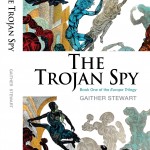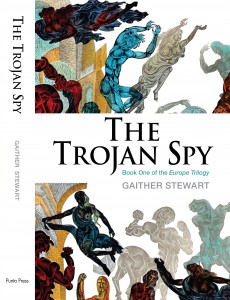
By GAITHER STEWART
WHEN I began The Trojan Spy in 2007, I intended writing a story about an extraordinary man, a Russian spy, who at the end of World War II was sent from Moscow to Berlin to become a sleeper and a future secret agent for the victorious Soviet Union. During the Cold War he became a double or, perhaps, a triple agent. The fictional figure of cosmopolitan, polyglot Anatoly Nikitin had been developing in my mind long before I wrote the first words about him. At the time I did not realize where Nikitin would eventually lead me. For during his long career extending from post-war Berlin well into the twentieth century he acquired many admirers and imitators on both sides of the conflict and gave birth to a series of characters who followed in his footsteps and ultimately fought wars far different from his.
In The Trojan Spy some of his followers accompany him, already an old man, in his battle against the hidden powers behind terrorism. Other characters influenced by Nikitin emerge and assume protagonist roles in the following two novels, Lily Pad Roll and Time of Exile, which together with The Trojan Spy form the Europe Trilogy. In each book some characters vanish, swallowed up by harsh happenings on the world stage; new ones replace them, too. In one way or another each of them seems like a creation of Anatoly Nikitin.
Though The Trojan Spy is considered a spy novel, Lily Pad Roll and Time of Exile change categories and delve into the chicanery and machination of corrupt and degenerate power today, in effect showing the dark side of the New World Order, which threatens the existence of planet Earth.
One might wonder why Europe Trilogy. The difference between the noun, Europe, and the adjective, European, is a subtle one. The three novels are set in Europe, although they are not strictly stories about only European matters; they spill over the edges and concern everyone on our planet. If I had to say precisely what all these words, pages, chapters and books are about, I would say they concern the deterioration of power into new forms of tyranny, aspects of which we can all witness today despite power’s deceptive and misleading forms. The three novels attempt to pinpoint the essence of the small world elite that has separated itself from the rest of mankind, spawning such horrors as globalization and neo-imperialism, while remaining cloaked by abstruse functions and concealed behind the gilded doors of international financial institutions and protected by power’s Praetorian Guards.
The best of the diverse characters who populate the trilogy demonstrate that people can and do change. They are persons who suffer from the compulsion to explore matters beyond their grasp, condemned to search for the unattainable, to know the unknowable, as per Ed Duvin in his Notes from the Asylum. Besides debunking the mythology of Capitalism, the Europe Trilogy attacks head-on Neo-Fascism, today called Corporatism, precisely as the Italian dictator of last century, Benito Mussolini, preferred to call his Fascism.
—Gaither Stewart
Rome, Winter 2012


